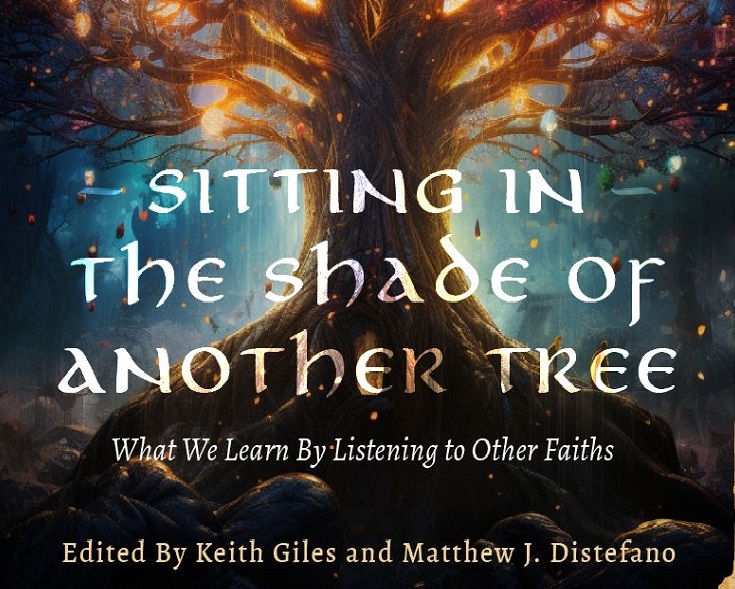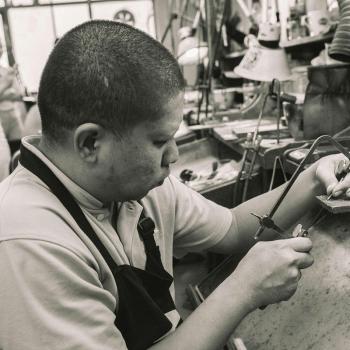In Quoir/Patheos’s collaborative bestselling book Sitting in the Shade of Another Tree, I discuss how Taoism made me a better Christian.

Rather than criticizing other faiths, I joined thirteen other authors to discuss what other religions get right. I was privileged enough to be invited to write a chapter: “Neo paganismand Taoism.” I invite you to pick up a copy at Amazon and learn from leaders from different faiths, each of whom seeks to understand other religions rather than prove them wrong. In my chapter, I discuss how Taoism made me a better Christian.
How Taoism Made Me a Better Christian
In a previous article, I discuss how Neopaganism impacted my Christianity. Taoism, likewise, has made a profound impact on my spiritual life. In Sitting in the Shade of Another Tree: What We Learn By Listening to Other Faiths, I write:
Neopaganism and Taoism are just two of the many religions I have studied—all of which have made me a better Christian. You might say that the interplay of Paganism and Taoism has been like the swirling Yin-Yang beneath my Christianity. Paganism appealed to the Charismatic and Pentecostal side of me. It offered a connection to nature that is hard to find in most of the Church, apart from Celtic Christianity…. If paganism charmed my Charismatic leanings, Taoism appealed to my contemplative side.
An Introduction to Taoism
In our new book, I write about my introduction to Taoism in ninth grade, when my World History teacher, Miss Carol, assigned us to read The Tao of Pooh, by Benjamin Hoff:
This delightful little book features the characters of AA Milne, who exemplify elements of Taoism. When Christopher Robin and Winnie the Pooh play Pooh Sticks by dropping twigs off a bridge and watching them float down the river, the author illustrates the Taoist principle of going with the flow. Pooh himself is Pu, the Taoist concept of the Uncarved Block. In a follow-up book, The Te of Piglet, the author discusses the Taoist principle of Te, or virtue, as exhibited by Winnie the Pooh’s diminutive sidekick. It was an approachable introduction to Chinese philosophy and religion—but it wouldn’t be the end of the journey.
Through the humor and unassuming wit of Winnie the Pooh, Hoff explained the concepts of Taoism. In Hoff’s work, I did not find a convincing argument to lead me to accept Taoism—instead, I discovered Taoist words and concepts that described a worldview that I already believed. I didn’t become a Taoist Christian. I realized that Taoism was the kind of Christianity I already practiced.
Yin and Yang
In Sitting Beneath the Shade of Another Tree, I write:
At age fourteen, besides the Christianity of my upbringing, Taoism was the religion that attracted me most. I loved the concept of Yin and Yang, and the idea of seeing things not as static good and evil, but as a swirling interplay of dark and light, night and day, recessive and progressive. On the surface, the black and white of the yin-yang symbol appear dualistic. Yet, when you examine the Taoist symbol you see a bit of Yin inside the Yang, and a drop of Yang inside the Yin.
Any notion of dualism fades even further once one realizes that by mixing all colors of paint together, you get black. In the same way, white light is composed of all colors in the spectrum. The black and white in the Taoist symbol represent all colors and all perspectives. So, far from static dualism, Taoism recognizes the constant motion and interplay of seeming opposites. It’s a collaboration, not a competition, between Yin and Yang. This seemed to fit my growing worldview more than the unwavering black-and-white moralism of my church upbringing.
Taoism has taught me to see a balance between Yin and Yang, recognizing that light and darkness are both natural and beneficial. Christianity is not so much a matter of light gaining victory over darkness, as much as it is seeking balance between the two. The fundamentalist Christianity of my childhood was so black-and-white that everything was either righteousness or sin. But understanding the Tao has helped me see the Yin inside the Yang, and vice versa.
More than a Religion—A Way of Life
In Sitting in the Shade of Another Tree, I give a further introduction to Taoism that includes key concepts and their application to the Christian life. Rather than understanding Taoism as exclusive to Chinese philosophy, I explain how it is accessible to everyone regardless of their religion. While Lao Tzu wrote the Tao Te Ching to explain the Tao (Way), Jesus said, “I Am the Way.” Taoism is a way of life taught by Chinese philosophers and embodied by Jesus. As early Christians were called Followers of The Way, today’s believers can become better Christians by learning Taoism.
Now Available on Amazon
Taoism made me a better Christian. It can help you with your Christianity, as well. I hope you’ll pick up a copy of our book. Sitting in the Shade of Another Tree is a book about interfaith dialogue. In its pages, you’ll read perspectives from Christian, Muslim, Baha’i, Hindu, Jewish, and other writers. You’ll read about Buddhism, women of faith, Roman Catholicism, Sufism, and more. Instead of bashing other religions for being wrong, or seeking to evangelize them, each writer shares the common vision of unity and peace. As we enjoy the shade of another tree or play together in the branches of the One Tree, we find we are one family—each member made in the image of the Divine.













